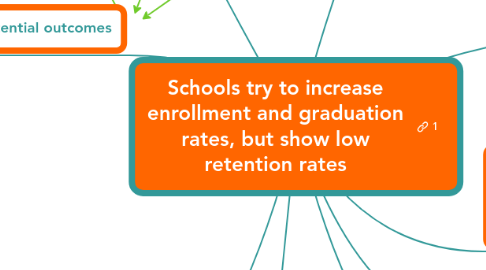
1. Initial Responses
1.1. From colleagues
1.1.1. numbers are diluted by failing or smaller private universities
1.1.2. retention is already being focus on at many universities because of the increased number of graduation rates
1.1.3. Increased retention rates would be good for the university system because it would directly increase retention rates and indirectly increase enrollment
1.2. From people outside higher ed.
1.2.1. Why are they spending public money on bolstering their private initiatives?
1.2.2. creating initiatives to keep graduate students in 3 years inflates the job market
1.2.3. keeping students in school is great because now we will have more educated individuals entering the eorkforce
2. Potential outcomes
2.1. Increased interest in retention procedures and initiatives
2.2. Increased graduation rates due to the increased retention rates
2.3. Increased school rating because of the increased graduation rates
2.4. Increased enrollment due to increase alumni support and school ratings
3. Data to support outcomes
3.1. Less years to retain
3.1.1. If students are in school for a shorter period of time, then you don't have to try so hard and create new programs to retain them.
3.2. Decreases cost
3.2.1. "At non-elite colleges, especially privates, many students drop out because of cost. And a major factor in cost is time to degree, which increases significantly when a student changes majors" (Marty, 2008).
3.3. First-Year Experience Course
3.3.1. "Madonna University has seen its freshman-dropout rate decrease sharply since it started a similar course in 1990, says Sister Nancy Marie Jamroz, vice-president for student life. The university now requires all traditional-age freshmen to take an orientation course, called College 101, in their first or second semester" (Geraghty, 1996)
3.3.1.1. "A number of colleges now require freshmen to take a course that provides them with basic information about campus resources and gives them suggestions about ways to adapt to the college environment" (Geraghty, 1996).
3.4. Second-Year Experience Course
3.4.1. Creating a “Sophomore Year Experience” has started to take hold at many universities including Stanford, Belmont, Emory University, Fairfield University, Greenville College, Hiram College, Indiana Wesleyan, University Kennesaw, State University, Loyola College, Macalaster College, McPherson College, Moravian College, Northeastern State, University, and more...
